The National Revolutionary Movements
Wherever nations are oppressed by imperialism, there is
resistance. Working women have always been courageous and indispensable fighters
for the liberation of their countries and for the right of self-determination of
oppressed nations.
Ireland: Constance de Markiewicz
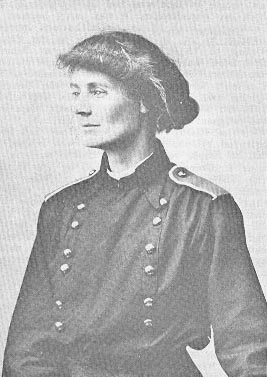 Constance de Markiewicz was somewhat unusual and different
from some of the other women revolutionary leaders, in that she was born, in
1868, into an aristocratic family. When she was 40 years old she repudiated her
class privilege, dedicated her life to the revolutionary movement and maintained
that dedication for the rest of her life.
Constance de Markiewicz was somewhat unusual and different
from some of the other women revolutionary leaders, in that she was born, in
1868, into an aristocratic family. When she was 40 years old she repudiated her
class privilege, dedicated her life to the revolutionary movement and maintained
that dedication for the rest of her life.
Constance became very active in 1908 when Lord Baden Powell,
who was a British Lord, announced the formation of the Boy Scouts. People in the
United States have been taught to believe that the Boy Scouts are a fairly
innocuous organization, but in fact Constance and her colleagues recognized them
for what they- are. Ireland was invaded 800 years ago and occupied by the
British. For these many years the Irish have been fighting for their
independence. Constance realized the danger posed to the Irish liberation
movement if the British Boy Scouts were to come in and brainwash young Irish
boys into supporting British imperialism.
Recognizing the significance of this development, Constance
immediately formed the Irish Boy Scouts, which was named Fianna Na hEireann,
which means basically "youth fighters of Ireland". During the time that Lord
Baden Powell was teaching his Boy Scouts how to tie knots and how to do
woodcrafts and carvings, Constance taught her scouts how to drill and march,
horseback riding and the use of firearms. In fact, she personally undertook the
firearms training, because she was an expert shot. She lived to see her scouts
fight in the Irish Rebellion in 1916 and become an important part of what
eventually became the Irish Republican Army, or the I.R.A.
Constance put the scouts to good use in Dublin in 1913, when
the owners of the railroads and factories did a massive lockout of the workers
and caused terrible hardships. The employers demanded that the workers undergo
cutbacks although they were already at starvation level. The workers resisted
and the owners locked them out. Thousands of workers went on a sympathy strike
until there were 27,000 workers out on strike. There were absolutely no social
benefits. There was no food stamps, there was no welfare, there was nothing.
They were on the street during a cold, bitter winter.
Constance organized what became known as Liberty Hall Kitchen
and she personally cooked thousands of gallons of soup that saved the lives of
thousands of working class children and workers' families. It was a familiar
sight to the workers to see Constance, in her coveralls with rolled up sleeves,
stirring for hours the big cauldrons of soup with a long, wooden paddle. Her
soup saved many a man, woman and child from starvation.
The owners organized vicious attacks against the workers.
They brought in the police, the military, and hired goons. The workers formed
the Irish Citizens Army, which was a workers’ militia to defend the strike and
to protect the workers from the attacks of the owners. Constance had the honor
of being one of only two women who were commissioned as officers in the Irish
Citizen Army. She was a lieutenant and a military trainer in that army and she
was right in the front ranks, defending the strike from the attacks of the
owners.
She also had the distinction of being a member of the Irish
Volunteers, which was a national revolutionary militia, which was formed for the
express purpose of leading an armed uprising against the British. She was one of
the few people in fact who had dual membership in those two organizations. It
was partly because of Constance that these organizations merged together to join
in what's known as the Easter Rising of 1916. During the Easter Rising,
Constance was assigned as one of the military commanders. She was second in
command at St. Stephen's Green, where some of the fiercest fighting took place.
She was credited with killing 3 British soldiers. She always claimed more and
was indignant that only three were verified.
The Rising was defeated. They had been betrayed by one of the
leaders who refused to call his troops out and, at a critical moment, an arms
shipment had been seized by the British. The rebels were forced to surrender.
When word came to Constance, after a week of fighting, that they had to
surrender, her reply was characteristic: "We can hold out for days. Let's die at
our post!" She was told that the decision had been made by the commander to
surrender and as a good revolutionary soldier she abided by the decision, gave
up her arms and was taken prisoner by the British.
She was sent to be court martialed along with the other
revolutionary leaders. When her court martial came up, Constance stood proud and
defiant before the British officers, wearing her military uniform and said, "I
plead guilty. I went out to fight for Ireland's freedom and it doesn't matter
what happens to me. I did what I thought was right and I stand by it." The
British sentenced her to death, realizing that this woman could never be
silenced and that she was a dangerous enemy to British imperialism.
Over a period of several weeks, the British started a program
of executing the leaders of the Rising, two, three a day, until they got to
James Connolly, who was a socialist leader and had led the Irish Citizens Army.
Connolly was so badly wounded in the fighting that they had to tie him to a
chair in order to haul him out into the prison yard to kill him. There was a
tremendous international outcry against the execution of these leaders and as a
result of this clamor the British were forced to grant some concessions. They
commuted the death sentence of Constance and stated that because she was a woman
they would sentence her to life in prison instead. When Constance was told how
Connolly was killed and that her own sentence had been commuted to life, she
protested, saying, "Why can't they let me die with my comrades?" and demanded
that she be allowed to die alongside Connolly, alongside Padraic Pearse,
alongside the other leaders of the Rising. The British by that time were under
tremendous pressure from worldwide protests and demonstrations and refused to
grant her that wish. She was very embittered and upset that she was not going to
be able to join her comrades in their martyrdom.
The revolutionary movement grew rapidly after the executions,
particularly after Connolly was killed, and- the British were forced to free
Constance in 1918 as a result. Immediately upon gaining her freedom she took up
arms again, went underground and began to fight for the liberation and
independence of Ireland. A provisional government was set up and Constance had
the honor of becoming the first woman in Europe to become a government minister.
She was the Minister of Labor in the provisional revolutionary government of
Ireland in 1919.
However, the majority of the leaders of the provisional
government betrayed the Irish revolutionary cause. They signed a treaty with the
British in 1922 that sold out 6 counties of Ireland and ceded those counties to
the British. That section of the country is known today as the six counties, or,
by the British, Northern Ireland, but in fact, it is an integral, historical
part of the nation of Ireland. By agreeing to this treaty, Ireland was torn
asunder.
Constance stood up against the sell-out
leadership and opposed this treaty. She once again took up arms, this time
against the Irish opportunist leaders who had sold out Ireland and agreed to the
partition. Once again she was a key military leader, this time in the I.R.A.,
the Irish Republican Army. She was credited with wiping out an entire machine
gun nest of snipers during street fighting in Dublin. Once again the rebellion
was defeated and Constance was given orders to surrender. Again she protested
saying, "Let's fight to the end." But again she obeyed her orders and agreed to
lay down her arms and continue the struggle in other forms.
She then traveled all over Europe, England, and the United
States, organizing and preparing for the day that she knew would come eventually
when the Irish Republican Army would again take up arms and would obtain the
liberation of Ireland. During that time she was tireless in her organizing and
her activities.
She returned to Ireland, and in 1927 she was taken ill with
appendicitis. When she became ill, there was immediately a clamor to get her to
the best hospitals and the best physicians. Instead, Constance told her comrades
to take her to the public hospital where the poor were, stating that whatever
was good enough for the poor was enough for her. She was taken to a charity
hospital in Dublin where she died on July 15, 1927.
After her death the government of the Free State of Ireland
(the 26 counties) turned their back on her, for she was a rebel and a
revolutionary. A funeral cortege was organized and demonstrations took place in
her memory despite the government opposition. Her death was mourned by thousands
of workers and national revolutionaries all over the country. A funeral guard
was provided by her beloved Fianna Na hEireann who stood watch for days beside
her coffin, as the workers came to pay their respects to a woman who had
selflessly dedicated her life to the cause of Irish emancipation and revolution.
Nicaragua: A Mother's Letter to
Her Daughter
by Idania Fernandez
Idania Fernandez was a young Nicaraguan fighter who was
killed by the National Guard in Leon on April 16, 1979 just three months before
Somoza was overthrown. She was 24 years old. A month before her death she wrote
these lines to her daughter Claudia. They remain a legacy from all revolutionary
mothers to all children.
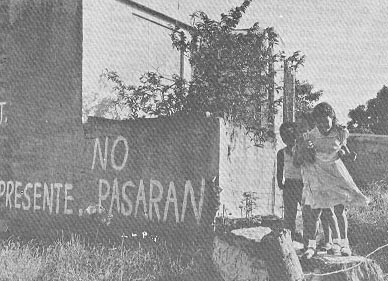 To my dear daughter:
To my dear daughter:
This is a very important time to people everywhere, today in
Nicaragua, and later in other countries in Latin America and throughout the
world. The Revolution demands all that each of us has to give, and our own
consciousness demands that as individuals we act in an exemplary way, to be as
useful as possible to this process.
I hope that someday, not too far off, you may be able to live
in a free society where you can grow and develop as human beings should, where
people are brothers and sisters, not enemies. I would like to be able to walk
with you, holding hands, walk through the streets and see everyone smiling, the
laughter of children, the parks and rivers. And we, ourselves, smile with joy as
we see our people grow like a happy child and watch them become new human
beings, conscious of their responsibility towards people everywhere.
You must learn the value of the paradise of peace and freedom
you are going to be able to enjoy. I say this because the best of our brave
people have given their precious blood and they've given it willingly, with
great love for their people, for freedom and for peace, for the generations to
come and for children like you. They've given their lives so children won't have
to live under this repression, humiliation and misery so many men, women and
children have suffered in our beautiful Nicaragua.
I'm telling you all this in case I'm not able to tell you
personally or no one else tells you these things. A mother isn't just someone
who gives birth and cares for her child; a mother feels the pain of all
children, the pain of all peoples as if they had been born from her womb. My
greatest desire is that one day you will become a true woman with a great love
of humanity. And that you'll know how to defend justice, always defend it
against whatever and whoever would trample it.
To become this kind of person, read and assimilate the works
of the great leaders of our revolution and of the revolutions of other
countries, take the best of each as example and put these into practice so that
you will continue to grow always. I know you'll do this and that you can do it.
And that gives me great peace.
I don't want to leave you words, promises or empty morals. I
want to leave you an attitude to life, my own (although I know it isn't yet the
best) and that of all my Sandinista brothers and sisters. I know you will learn
how to use it.
Well, my plump one, if I have the privilege of being able to
see you again--which is also a possibility – we'll have long talks about life
and the revolution. We'll work hard carrying out the tasks we're given. We'll
play the guitar and sing and play together. And through all this, we'll come to
know each other better and learn from one another.
Come, show me your pretty face
Lovely like flowers and freedom
And give me energy to struggle
Uniting your laughter and our reality
Daily I think of you
Imagining always how you are
Always love our people, and humanity
With all the love of your mother, Idania.
Until our victory, forever.
Free Homeland or Death.
Azanian
Women
The women of Azania (South Africa) have played an important
role in the struggle for the liberation of their country. Exploited as workers,
oppressed as Africans, Azanian women bear the additional burden of sexual
inequalities. In South Africa, women provide another source of readily available
cheap Black labor so necessary for the system to survive. Yet these women, whose
consciousness has spanned several dimensions of oppression, play a crucial role
in the advancement of the working class struggle.
South African women played a leading role in the general
political struggle of the 1950's and 1960's. Specific campaigns led by the women
were those which attacked the basis of their particular oppression. In their
campaigns against the extension of pass laws to Azanian women and in other
struggles, the women represented a strong, united force to be reckoned with.
Their strength and determination inspired the men who fought alongside them and
they advanced the liberation struggle considerably during this period.
The history of the oppression of African women in South
Africa is similar to that which characterized all colonized nations during the
plunder of previous centuries. Expropriation of tribal lands, slavery, forced
labor, destruction of indigenous culture – these were the effects of the
onslaught of colonialism on the people of Africa and elsewhere.
In South Africa, the apartheid state has ruthlessly enforced
the continuation of a system in which African women are oppressed on the basis
of their skin color and their sex. Through the system of migrant labor, the pass
laws and other special laws affecting African women, the regime has created a
particularly unique form of oppression, distinguishing it from other forms of
female oppression within capitalist societies. In South Africa women are
stripped of all those rights considered basic human rights throughout the world
– the right to choose where to live and work, the right to live with their
partners and husbands, the right to bring up and care for their own children.
It is the African women in particular – those who suffer from
both national and sexual oppression – who sacrificed most in the struggle
against the South African state's definition of them as 'superfluous appendages'
of African male workers. From as far back as 1913 when Azanian women organized
demonstrations against being forced to buy new residence permits each month,
until today, countless women have been beaten, killed, arrested, detained and
forced into banishment. This repression does not stop the women of South Africa.
Azanian women are rising up against the state. A line in a song by South African
women protesting the pass law reads:
"Now you have touched the women,
you have struck rock,
you have dislodged a boulder:
You will be crushed!"
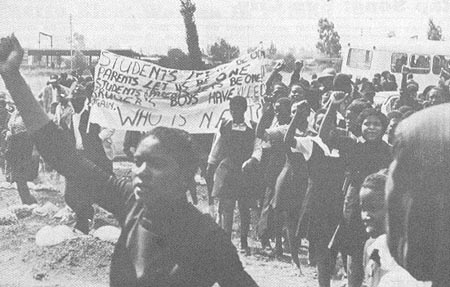
Wither Thou Goest
by Willie Mae
Brown
Oh, Great Africa, Strong One,
Rise up in revolution.
Fight with the strength of a
blacksmith's hammer,
Pounding and molding with the
spirit of the Bird Eagle.
Let the drums roll,
and with each cadence
Go forward with fists raised on high
And cries of victory to the revolution.
You who have a vision of what
tomorrow can be... Revolution!!
The Revolution is being a free man,
The Revolution is being 24 million free men
-who are Strong.
Freedom – the word grips your
conscience like a vise.
For you know tomorrow will
be different-
Tomorrow – there will be no
whips, gas, jails, or rifle
bullets to repress your ideals.
Tomorrow-the walls that the
enemy have built around you
depriving you of your freedom
will crumble like shattered glass.
You will not be subdued
You have a vision of what can be.
I hear your drums and with each cadence
Your cries of freedom penetrate my soul.
I hear you say:
Our cause will prevail,
for it is the cause of justice.
It is the cause of
a struggling people.
I hear you Brothers and Sisters of Africa.
Tell your oppressors:
I will die in the Revolution,
For it is better to die as rebels
Than to live as slaves.
Rap Song: Sun City
In the past year, (1985-86) people around the world have been
focusing on the struggle in South Africa. The Azanian peoples’ heroic
battle for freedom, liberation and national independence has captured the hearts
and minds of revolutionary and progressive people throughout the world.
Progressive and revolutionary musicians and entertainers have also joined this
struggle and have re fused to play or perform in the resort area in South
Africa called Sun City. A collection of rockers and rappers released a song
about the boycott which is named "Sun City." In New Orleans three young,
Afro-American girls have re-worked some of the words to "Sun City" as follows:
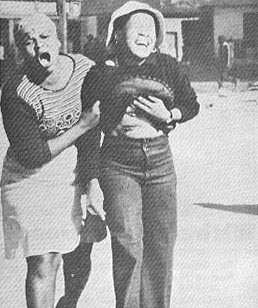 |
An Azanian woman shot by
government forces during a protest against the apartheid regime.
We're rockers and rappers united and strong
We're here to talk about South Africa,
We don't like what's going on
It's time for some justice
It's time for the truth
We've realized there's only one thing we can do
I AIN'T GONNA PLAY SUN CITY
Relocation to phony homelands
Separation of families, I can't understand
23 million can't vote because they are Black
We're stabbing our brothers and sisters in the back
I AIN'T GONNA PLAY SUN CITY
The government tells us we're doing all we can
"Constructive engagement" is Ronald Reagan's plan
Meanwhile people are fighting and keeping their hope
This quiet diplomacy ain't nothing but a joke
I AIN'T GONNA PLAY SUN CITY
It's time to accept our responsibility
Freedom is a privilege, nobody rides for free
Look around the world it can't be denied
The rich are always on the wrong side
I AIN'T GONNA PLAY SUN CITY
Boputhuswana is far away
But we know it's in South Africa
No matter what they say
You can't buy me, I don't care what you pay
Don't ask me Sun City,
We will fight for a new day
I AIN'T GONNA PLAY SUN CITY
Puerto Rico: Women in Prison
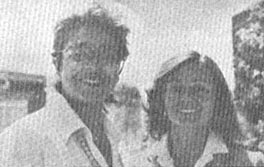 |
Dylcia Pagan and Carmen
Valentin, Puerto Rican prisoners of war.
Puerto Rico is a nation that has been ruthlessly colonized,
exploited and oppressed by U.S. imperialism. The struggle for Puerto Rican
independence has gained the respect and support of millions of working class and
oppressed peoples all over the world. Despite superior arms, fierce repression
and relentless social and cultural pressures, the U.S. government has been
unsuccessful in its efforts to crush this movement. Today, the jails and prisons
of the U.S. hold scores of prisoners whose only "crime" was to fight for the
independence and sovereignty of Puerto Rico. Among these prisoners are grand
jury resisters, whose "offense" is that they have refused to collaborate with
the U.S. government in its terror campaign against the independence movement.
Puerto Rican women have been at the forefront of the
independence movement and have demonstrated their tremendous courage and
dedication to the cause of their nation's liberation. They are an inspiration to
working women everywhere and their lives reflect the power of women who have
been transformed by their participation in revolutionary struggle.
Dylcia Pagan Morales and Carmen Valentin are both
fighters for Puerto Rican independence who are currently being held in U.S.
prisons. 'Though they could not attend, they each sent statements for our
International Women's Day celebration in 1986:
Good evening, dear friends. My name is Dylcia Pagan. I am one
of the Puerto Rican prisoners of war that was captured in Evanston, Illinois,
near Chicago, April 4, 1980. I, with my eleven other comrades, took the position
of Puerto Rican prisoners of war.
You are probably asking yourselves, "Why P.O.W.'s?" Well, the
situation of Puerto Rico requires us to have made that decision. According to
international law, any country that is subjugated by colonialism has the right
to take up arms to defend themselves. And any person captured or accused of such
an act has the right to declare themselves, also according to the Geneva
Convention, a prisoner of war.
Most people do not understand that there is a war between the
United States and Puerto Rico, because it is not to the advantage of this
country that the overall American population understand the true situation and
the plight of the Puerto Rican nation. Puerto Rico is a country that was invaded
militarily 86 years ago by the United States militia. What most of you witnessed
in the Grenada invasion never came near to what our homeland went through 86
years ago. From that time to the present the U.S. government
has had total control over our livelihood, our economy, our education, all of
the aspects that make one a person, and, for us, to be Puerto Rican.
Many people ask us, "What about the question of violence? Why
violence?" It is a very important issue. The question of violence is a
necessity, simply because this government only respects violent acts. As Puerto
Rican people we are probably the most peace-loving humans in the world. I can
say for myself and my comrades, we are totally non-violent people. But it is the
conditions that the United States government has created that has made us resort
to revolutionary, armed struggle. And that is our ideology. We believe in
protracted peoples war and we realize and fully understand that the only
alternative for the Puerto Rican nation to be free is with the use of arms.
There isn't a nation in the world that has gained its independence without the
use of violence. This is true particularly when we are facing the most powerful
country in the world and the most treacherous country in the world, who today
sits and chooses to accelerate its budgetary allocation for military operations
as opposed to maintaining and being concerned about the domestic plight of
Americans in this country.
I am a Puerto Rican woman. I am 39 years old. I am a mother
and a wife. My comrade is William Morales who was captured in 1978, who
gloriously escaped in 1979 and unfortunately was re-captured in Mexico City in
1982. We have a beautiful son, Guillermo Sebastian Morales, who neither of us
have seen since he was 13 months old. But yet, I do not despair, simply because
I believe so much in our struggle and I know that we are correct and that
history will exonerate us.
I am facing right now 55 years. Some of my comrades are
facing 90 years. We do not see any difference in that amount of time because, as
we all say, we came in together, we will be in freedom together. And we clearly
know that history will exonerate us because our cause is a just cause.
Looking at the Puerto Rican nation, when we look at women in
Puerto Rico, we realize that 48% of our women have been sterilized against their
will. 38% of our men have had legal vasectomies, 12% of our land has been used
for military operations and the U.S. government continues its plot, its
genocidal plot against our people. By the year 2020 they wish to convert our
island into a larger military bastion than it already is, by creating 18
military-industrial parks. For what benefit? Their own. They have discovered
natural, elementary ores that will provide more elementary ores for the
continuation of military warheads.
Again, internationally, the U.S. has violated the treaty of
Tlatelolco by placing a nuclear base in Puerto Rico. Recently 50,000 people
demonstrated against nuclear arms on the island. That in itself gives us the
strength to continue forward, to be able to survive the conditions that this
government has put us in prison.
For the past year and a half, the government has been moving
me throughout the U.S. The government, I am sure, hoped and wished that my
spirit would be broken. But it is very difficult to kill a revolutionary, when
we solely believe in our principles, and in the liberation and socialism for our
country.
I would like to share with you a poem that I wrote early on
when I was captured and I hope you enjoy it.
My dear comrades, before closing and before my poem, I just
want to remind you, to please, do work in solidarity for the Puerto Rican
independence movement. It is important... If you are freedom-loving human
beings, you must respect our position, and continue to struggle so that the
level of consciousness of people may rise to the point where people begin to
understand and clearly, clearly understand why peace-loving people like
ourselves make the decision to have to use arms.
Have You Seen "La Nueva Mujer Revolucionaria Puertorriqueña?
"
by Dylcia Pagan Morales
She walks with the stride of her borinquen ancestry as a "Taina
Clásica"
She bears the child which will reap the benefits of our new society,
She knows where she is headed, for her commitment is to her people.
She speaks with dignity and defiance, for she knows that her principles are
correct and reflect the oppression of her homeland and her people.
She stands with fervor with arm in hand beside her compañeros.
For she is prepared to meet whatever consequences arrives.
The signal is given!
She responds fearlessly for she is certain that victory will prevail.
She is captured by the enemy
But she does not despair, for she knows that her actions have been heard and her
people will respond.
The struggle continues until death.
Carmen Valentin is one of 10 Puerto Rican Prisoners of
War who received a 95 year sentence for seditious conspiracy against the U.S.
government. Carmen received the longest sentence because the judge said that she
showed no remorse. Carmen's statement after being convicted of seditious
conspiracy clearly shows her revolutionary commitment to her people:
"Your press, your justice system, your repressive forces,
your government, has branded us as terrorists. But the word ‘terrorist’ no
longer means to the Puerto Rican nation what it used to. Instead of arousing
fear or censure, ‘terrorism’ is a call to action. To be called a terrorist by
our enemy is an honor to any citizen; for this means he or she is fighting
with a gun in their hand against the monstrosity of the present government and
the suffering it causes."
On March 8, 1986, she sent the
following message of greetings for International Working Women's Day:
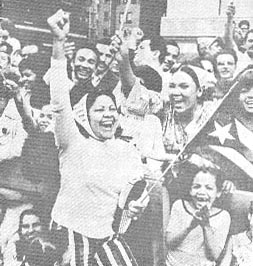 |
Demonstration for Puerto
Rican independence, New York City, 1970
My dear friends and comrades. My name is Carmen Valentin, one
of the fifteen Puerto Rican prisoners of war in this country. I was captured,
along with nine other comrades on April 4, 1980. Prior to that I was involved
with all aspects of the development of the Puerto Rican community in the West
Town of Chicago, Ill.
I was primarily involved in the educational
process where I am a high school teacher and worked as such for
many years. During the illegal proceedings held in this country's courts, we
were charged with possession of arms at the state level. Later we were tried for
seditious conspiracy. I am presently serving a 98 year sentence.
From the inception, we proclaimed ourselves prisoners of war
according to the protocols of the Geneva Convention. We have done this because
history dictates it, as our country was militarily invaded in 1898 and since
then has been occupied illegally by this country. Puerto Rico is not part of the
United States, nor has it ever been. Therefore, to be accused of seditious
conspiracy is the impossible crime.
We are fully recognized by a broad sector of our people, as
well as by many progressive elements of the international arena, as prisoners of
war, carrying on a war in an attempt to decolonialize our country. The use of
arms was undertaken by us as a group and continues to be used today because all
channels of peaceful protest have been ignored and are therefore null
and
void.
We truly believe that the only solution to our nation's
plight is that of armed insurrection. We, as a nation, have been victimized by
the violence of this country and as a consequence have turned violent means into
avenues that will bring a peaceful future. We wish to urge all peace-loving,
progressive people to study the struggle of the Puerto Rican people for only
then can we hope to add your necessary support to the sacred cause of arms for
the liberation for our Puerto Rico.
I would like to dedicate this poem to all of you that daily
struggle to establish peace and justice. For it is exactly what we are seeking
to establish. I would also like to dedicate this poem to my son, Antonio, who is
16 years old and a great example for the youth of today. To all I send my
revolutionary love, for like the poem says, we are isolated from all and truly
miss the pleasures of real life. But if this is necessary to reach our sacred
objective, let it be until death. To all women who struggle we send our love.
Demonstration for Puerto Rican Independence, New York City,
1970
I Will Never Be A Traitor
by Carmen Valentin
In the long process of liberation
I can perhaps lose my life,
I can spend days hungry and dismayed,
I can be mistreated or destroyed,
But I will never be a poisonous traitor.
During this long and anguished journey
You can – Oh cruel enemy! –
try to steal our homeland,
to rape our culture,
to fill your jails and dungeons daily
with our young and fertile blood;
You can terrorize the world
with lies about our cause.
But you will never be able to count on me.
I will never be a poisonous traitor.
Oh, cruel enemy! you can rob me of the son of my life,
deprive me of every loved one,
isolate me entirely,
humiliate me before the world –
But I will never be a poisonous traitor.
Oh! Homeland of my life,
For you I have lived and will know how to live.
Without you I am nothing, it is better to die;
Oh! Homeland of my soul
I am joyous
for I am yours
and I am heading towards victory!
Click here to return to the International Working
Women's Day contents
 Constance de Markiewicz was somewhat unusual and different
from some of the other women revolutionary leaders, in that she was born, in
1868, into an aristocratic family. When she was 40 years old she repudiated her
class privilege, dedicated her life to the revolutionary movement and maintained
that dedication for the rest of her life.
Constance de Markiewicz was somewhat unusual and different
from some of the other women revolutionary leaders, in that she was born, in
1868, into an aristocratic family. When she was 40 years old she repudiated her
class privilege, dedicated her life to the revolutionary movement and maintained
that dedication for the rest of her life. To my dear daughter:
To my dear daughter:


